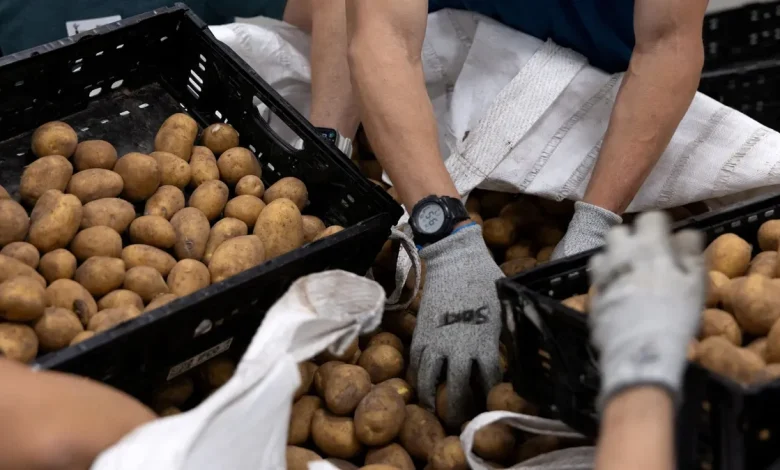SNAP recipients feel ‘betrayed’ and ‘judged’ amid government shutdown cuts

Winners and losers of the government shutdown deal headed to the House
Not everyone got what they wanted in the government shutdown deal that passed through the Senate.
WASHINGTON – Four days a week, Tuesday through Friday, Leah Skinner climbs out of bed early, gets her autistic son ready for school, takes her medication and heads to her job as a shift manager at McDonald’s.
A single mother, Skinner, who asked to be identified by her middle name to protect her privacy, has been working since she was 16. But after two bad brushes with COVID and two serious heart attacks, she no longer has the stamina to pull the nine- to 12-hour shifts she used to put in regularly. Now, she works five-hour shifts and relies on $300 to $400 in food stamps every month to supplement her income.
This month, the food stamps never arrived. Instead, she got a notice saying the benefits would not be coming because of a funding battle between Republicans and Democrats in Washington that shut down the federal government. Without the food assistance, she said, she will be forced to turn to help from a food bank, which means she won’t be able to get the vegetables, proteins and fibers she needs for her heart-healthy diet and to help control her diabetes.
“It’s like a game of chess, and they’re using us as pawns,” Skinner, who lives in Palmer Lake, Colorado, said of the funding fight in Washington. “We’re the most sacrificable piece and the least important on the board.”
The ones getting hurt, she said, are “a lot of hard-working people who need the help.”
Some 42 million Americans receive food assistance every month through the Supplemental Nutrition Assistance Program, or SNAP, formerly known as food stamps. But many recipients have been left wondering how they will put food on their table after funding for the program lapsed in November for the first time in its 60-year history.
The Trump administration put recipients on notice last month that it would not pay full benefits in November because Congress had not approved funding for the anti-hunger program because of the government shutdown. States, cities, and nonprofit organizations sued, but the case remains tied up in the courts.
The House voted Wednesday, Nov. 12, to give final approval to a bill to end the 43-day shutdown, the longest in U.S. history. The reopening of the government will restart the flow of SNAP funding, although exactly when the benefits will be available remains uncertain.
The Trump administration had asked the Supreme Court to allow it to continue to withhold $4 billion in funding for the program while the government remained closed, and that case remains before the high court, which is expected to weigh in on Thursday, Nov. 13.
For seniors and low-income Americans who depend on monthly food assistance, the fight over SNAP benefits has been unsettling. Some received part of their benefits for November. Others have received none at all.
The cuts have forced many to look for ways to stretch their grocery budgets or choose between medicine and food.
Denise Stinson, who has epilepsy and Parkinson’s disease, lives with her sister in Colorado Springs, Colorado. She survives on $1,138 per month in Social Security and about $180 a month in SNAP benefits. But this month, the SNAP benefits never showed up.
Stinson, 69, tries to eat healthy foods like fresh vegetables and proteins, but had to change her diet when she didn’t get her monthly SNAP allotment.
“I’m eating more pasta and things because I can’t afford to get the good food that I would usually get,” she said. “It’s not horrible yet, but if it continues, I don’t know what I’m going to do.”
Stinson suffers from short-term memory loss and tremors because of the Parkinson’s. A few years ago, she had an epileptic seizure while cooking and spilled a skillet of hamburger gravy over her leg, causing severe burns that landed her in the burn unit for three weeks. She fears the stress over the loss of her SNAP benefits will cause the seizures to occur more frequently.
“This whole mess has made me so edgy,” she said.
Marcia Gamber, a SNAP recipient in Webberville, Michigan, was forced to move in with her sister six years ago after she tripped over a cat, fell down a flight of stairs and broke both of her legs. Her legs didn’t heal properly, and she suffered through a series of surgeries and setbacks, including an infection, septic shock and a heart attack that damaged her kidneys and lungs. Most days, she hobbles around the house with walker and uses a wheelchair when she has to venture outside or go a long distance.
“I could be in worse shape,” she said. “I could also be dead.”
Gamber, 61, worked in the insurance industry but has been unable to work since her accident. She spent four months in the hospital, lost her house and car, and depleted her retirement savings and investments. She now lives on $967 a month in Supplemental Security Income. By the time she pays her bills, she has just $11 left.
Gamber had been receiving $290 a month in SNAP benefits. But last week, she received notice that her SNAP payments would be lowered to $130 a month because of the One Big Beautiful Bill Act, a tax-cut measure that President Donald Trump signed into law in July. Advocacy groups estimate the measure will cut $186 billion in SNAP funding over the next 10 years to help pay for tax cuts.
“I’m not starving to death like lots of people, but we are getting to that point if I’m only going to get $130,” she said. “I’m down to, ‘What can I make soup out of?’ Because you can stretch soup for a week.”
Gamber’s SNAP benefits usually arrive on the 15th of every month, so she doesn’t yet know if she will receive partial benefits – or any at all. She thinks the Trump administration needs to change the way it perceives people who receive social assistance benefits, whether they are SNAP, SSI or Medicaid.
“I feel betrayed, I feel invisible, and I feel judged,” she said. “These are not lazy, horrible people like we have been labeled. Poverty is not a moral failing. It’s not a character flaw. Most people are here through circumstances beyond their control.”
Skinner, the shift manager at McDonald’s, said she has stopped talking to people who think, because she receives food assistance, that she’s mooching off the system.
“I can’t believe that we live in a country that we are OK with just letting other people starve,” she said.
Michael Collins writes about the intersection of politics and culture. A veteran reporter, he has covered the White House and Congress. Follow him on X: @mcollinsNEWS





